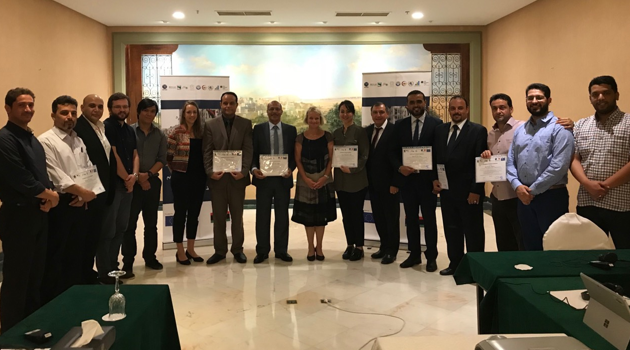The University and Municipality of Benghazi have Received Training with EU funds to Support the Reconstruction Process
Employees of the Municipality of Benghazi and the Public Administration Department of the Benghazi University have taken part in a training this week focused on best practice in the field of public administration.
This training, the fifth of its kind is provided by France's national expert institution, École Nationale d'Administration (ENA) and not only aims on building local capacity in Benghazi but also promote cooperation between institutions and European partners.
These training sessions are part of a larger EU-funded project which is implemented by ACTED and has the objective to support Libyan local actors to improve service delivery and better manage the reconstruction efforts, following the 2014 crisis that led to widespread destruction and displacement in the city.
The multi-faceted project includes support to the Projects Office of the Municipality in damage assessment and building rehabilitation, empowering civil society to lead community stabilization efforts and support to the governance of the health sector including the training of Libyan surgeons. This particular training focuses on support to the Municipality’s administration in order to strengthen their reconstruction efforts.
“The idea of bringing together a consultative body [like the university] with an implementing institution [the municipality] has created a very important partnership, and both institutions are benefitting from one another,” said Alaa Nawal, Deputy Director of the Municipality’s project office. “This training will benefit us in the long term for the reconstruction process, to define a vision for the city of Benghazi and its planning. We now have a more comprehensive and inclusive vision for the next steps needed.”
Hanan Bazina, a professor in the university, added, “Public and local administration should play a big role in the building of the nation. We’re helping the municipality in improving their governance structure, preparing training packages for the civil servants, which we are keen to see being implemented once we return to Benghazi. We are enthusiastic to start working on the ground and see the positive impact this project will have on our city".
EU Ambassador Muscheidt stressed: "This project is an example of European Neighbourhood Policy in practice in Libya as professionals from the EU and Libya are engaging in exchange among peers"
The intensive training sessions have included assessing the capacity and structure of the municipality in order to draft an effective training curriculum, and defining a long-term vision for Benghazi which brings together all local actors. The session also included drafting and defining projects to achieve the municipality’s vision of Benghazi.
(Source: EU)





